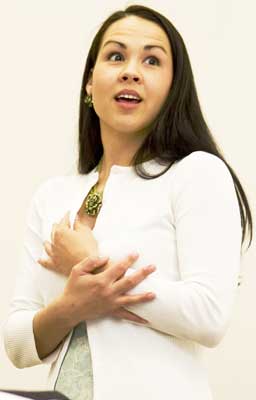The members of Sigma Omicron Epsilon, a Native American sorority, honored the ninth Anniversary of the founding of their sorority last night by hosting a speech by April Whittenmore, a graduate of Campbell University and member of the Lumbee Indian tribe. Whittenmore is a nationally recognized speaker, cultural ambassador, performer and model. The speech, entitled “Tales of an Urban Indian,” was held in Cox 214.
Whittenmore’s speech dealt heavily with personal experiences from her childhood in Fayetteville, N.C. Racial biases and stereotypes were something that Whittenmore said she faced on a daily basis living in Fayetteville.
“Growing up in Fayetteville as an Indian was hard,” Whittenmore said. “I was supposed to be born in Pembroke, and I was supposed to go to UNC Pembroke,” Whittenmore said, referring to the city and college located in an area of the state heavily populated by Lumbee Indians. “I only know how to be me. I don’t know how to be Indian or white or black or anything else.”
Whittenmore also spoke about how diversity affects people’s perceptions of certain issues. She drew heavily on stories that involved members of her family to illustrate the point. One story involved her father, who as a young boy was rummaging through an abandoned store when he found a box of what he thought were firecrackers. After telling of how her father tried unsuccessfully to light the firecrackers, Whittenmore reached into her bag and removed the “firecracker” that her father had been attempting to light — a tampon.
She used the example to show how diversity affected people’s perception of Indians in an urban environment- just as her father did not understand the box of feminine hygiene products, people in the city did not understand Indians, having never taken the time to learn about them.
In addition to marking the anniversary of the founding of the sorority, the event also was intended to help promote the thirteenth Annual Native American Student Association Pow Wow gathering, which will be held this Saturday from noon to 4 p.m. at Carmichael Gym.
The speech also contained a reference to Whittenmore’s mother, who as a young girl wasn’t allowed to go through the front door at a pharmacy where she was going to pick up medicine for a family member. When she picked up the medicine, the white pharmacist shoved the bag rudely in her mother’s direction, an act of racial intolerance that inspired Whittenmore’s mother and continues to inspire Whittenmore today.
“That pharmacist made her feel like she was nothing, but my mother got over it by becoming a registered nurse,” Whittenmore said. “When you’re surrounded by hate, you always have your mind to escape.”
As fate would have it, Whittenmore’s mother would one day have the same pharmacist as one of her patients. Hearing about her mother seeing the pharmacist in the hospital bed many years later was a final example in overcoming prejudice for Whittenmore.
Her mother, Sandra Whittenmore, is today one of her most dedicated and most vocal supporters. She was in the audience last night and expressed a feeling of maternal pride at seeing her daughter speak.
“I’ve seen my daughter speak many times, but this one was more informal than I was used to seeing from her. I wanted her to stand up straight, but as a mother you’re always proud of your kid,” Whittenmore’s mother said.
Members of the sorority were joined at the speech by members of other Native American campus groups from N.C. State, as well as by visiting Native American students from ECU.
Those who attended the speech expressed their feelings about seeing a fellow member of their tribe speak.
“The speech brought about diversity and talked about Native Americans and some of the issues Native Americans deal with, even today,” Erica Locklear, a co-president of the sorority and senior in sociology, said.
Other students in the audience agreed that the message of the speech was very important to the NCSU campus.
“It was a wonderful speech, and it was important because she spoke on diversity,” Christine McArthur, a sophomore in political science, said. “Diversity is an important issue not only on our campus but everywhere.”








